Experiences from South Sudan
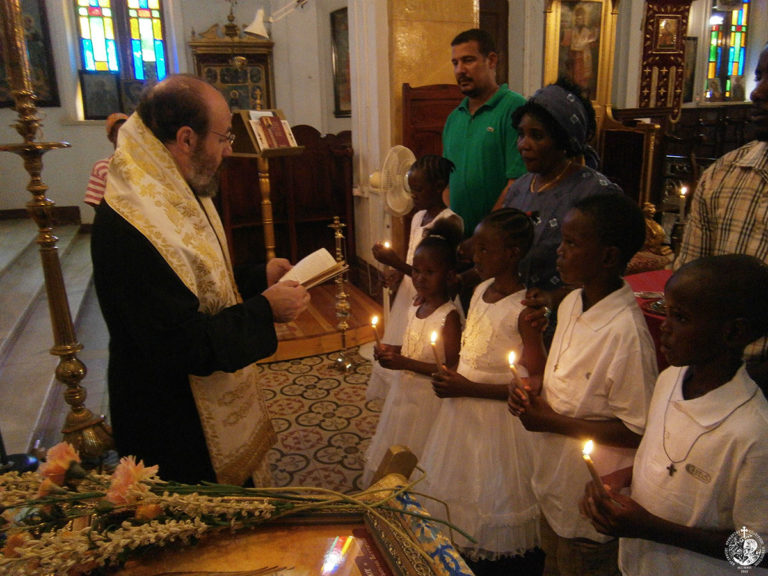
Photo from here
Ελληνικά: «Άναψα τα καρβουνάκια στην άκρη του γεμιστήρα του καλάσνικοφ, έβαλα το λιβάνι και θύμιασα τους ανθρώπους»...
By God’s grace and the blessing of His Beatitude Theodoros II, Pope and Patriarch of Alexandria and All Africa, we set out earlier this year on a tour of the inaccessible region of South Sudan.
For decades a fierce civil war had been raging and was still continuing unabated, which created continuous frustration and despair on the indigenous people.
I started without knowing where I was going, my destination was undetermined as all information and instructions were confusing and instead of clarifying things for me, in fact they confused me even more. Certainly the invariable advice was “be careful”.
Those moments I remembered what I had read in the Bible and had not fully understood. In Apostle Paul’s epistle to the Hebrews, chapter 11: by faith, Abraham, when he was called, obeyed to go out to the place which he was to receive for an inheritance. He went out, not knowing where he went. The personal experience of access to an unknown place, showed me how difficult it is humanly to set out for someplace without knowing where you are going. And here even the best information for the South was disheartening.

Laying the stone for the first missionary center in South Sudan
We also laid the foundation stone of the St. Mark new missionary center in Mogala region in the eastern end of the capital city Juba. There, for the blessing of water service we had no censer available, so looking for one around to give a rough and ready solution, the only thing I could find handy was a magazine of bullets from a kalashnikov. I lit the charcoal briquettes at the one end of the magazine, placed the incense on top of them, held the magazine from the other end and censed the people accompanying me. I could not help thinking that with that magazine of the kalashnikov which had scattered death, I was meant to cense at the sacred service for the laying of the foundation stone of Saint Mark’s first missionary center. Within me, I was praying that those tools of war and destruction would be transformed into God-worship utensils. Only then could peace and unity of the people reign in this country.
The second trip two days later involved my moving to the western tropical city of Wau in South Sudan. It was a revelation to me to find there people who are pure, sincere, genuine, and unfortunately absolutely poor without electricity or water. Imagine how many essential things are lacking there, while for us in the western world they are unquestionably taken for granted. A pleasant discovery, however, was the fact that lack of electrical power could turn into something good… One can see the stars at night and feel like they are in a spacious place.

By the grace of God we baptized ten children and reopened Prophet Elijah church, which had been built by Greeks around the beginning of the previous century; the church bell rang again after many decades. I also read them the forgiveness prayer and they all received Holy Communion.
There, one night in the humble dinner which they so nobly prepared for me, where everyone ate with their hands from the same big plate on the table, they told me around the brazier with the lit fire stories about how they lived in the days of the civil war… They tore off the tin from the roofs of their huts to cook on it in order to eat something, while at the same time food was scarce and disease was treated without even the basics, such as medicines or doctors.
Meanwhile, malaria has ravaged half the population. There is not a single person who has not got sick with malaria. The stronger organisms withstand, whereas the weaker die out, especially children. Everyone’s life is on the razor’s edge and anyone may die at any time. Life is uncertain, death is a daily routine, whether it comes from cholera or malaria or Ebola; and if one manages to escape all these, the civil war awaits around the corner, which is why whoever survives there, is a champion of life.
Our Greek community in Wau consists of descendants of Greeks who got there at the beginning of the twentieth century, circa 1910. It was a great thrill for me to get there and find out that their first concern was to call me to go and conduct a Trisagion memorial service over their Greek fathers and ancestors that are buried in the Greek cemetery, which happened before I even had time to arrange my things. I put on my vestments, lit the censer and while chanting during the service , I was thinking about the bravery of those people to be forced to leave their homeland, i.e., the Greek islands of Lesbos, Lemnos and others to come here at the edge of the world to make families and work under unfavorable living conditions, outside of civilization and amenities. A rough estimate would say that this region of the world has always been 100 years behind. So it was a great feat then in 1910 that they created the community, a Greek club, a school, they built a church, in other words, they created a small Greece out of Greece to live in and keep it alive inside of them. I noticed that on their graves they had elaborately carved the marble with nostalgic words for the homeland, which could make even a stone-hearted man shed tears. They were really admirable people.

Finally the day of return to the capital city Juba came due to an earlier meeting arrangement with the country’s Foreign Minister. At the airport I felt that I did not want to leave, so when I had to say goodbye to the people and head to the plane, I felt my heart bleed, as if it did not want to be separated from them. However, I was comforted as this little death, separation, will bring resurrection one day, since my return there is a given.
Dear members of the Orthodox Missionary Fraternity, as sadness when shared decreases and joy is multiplied, I have the pleasure of contacting you and making you partakers of our missionary efforts in Africa. We plant the seed, you water it and God makes it grow; therefore, I pray feverishly for the success of our joint efforts so that the holy name of God is praised in every place now and forever.
May His Grace keep you strong.
Narcissus (Gammoh) of Nubia
Two years of missionary ministry in Burundi & Rwanda
Country: Burundi, Rwanda | Diocese: Diocese of Burundi & Rwanda
For exactly two years, by the Grace of God and the blessings of His Beatitude Theodore II, Pope and Patriarch of Alexandria and All Africa, I have been serving the martyred Diocese of Burundi and Rwanda, which came into existence just a few years ago. Thus I will presume upon your love and patience in order to make a brief review of the management of your loving contributions during these two years of my ministry. Besides, it is proper that you should know where your money goes, which goals we have achieved, which we have missed as well as our plans for the future… I consider it necessary and honorable to make this accountability, so to speak, report.
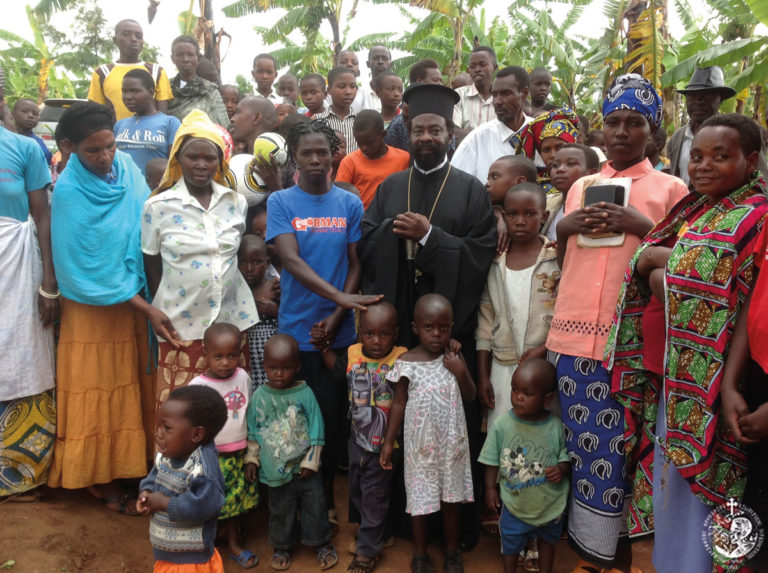
As you all know, not so long ago Burundi
and Rwanda came out of a fratricidal war, which resulted in genocide -in
just 100 days one million people were massacred, among them innocent
children; this marked the last decade of the 20th century and proved
beyond the slightest doubt that “man is a wolf to man”. The war memorial
museums in Rwanda bear undeniable witness to that. It is there that one
wonders how man can be led to acts of brutality when driven by hatred,
power lust, conflicting interests and personal ambitions.
It is such people that we minister to and
try to comfort, alleviate their suffering and uplift their spirit. Like
all wars, this war ended at some point as well, giving peace a chance.
It is then that our role started.
There are numerous needs to meet, spiritual as well as material. The
visible physical wounds have healed, but there are wounds that are
unseen, the wounds and scars of the soul, which are really very hard to
erase. Our efforts are focused on making these poor creatures feel again that they are human beings and on helping them to live.
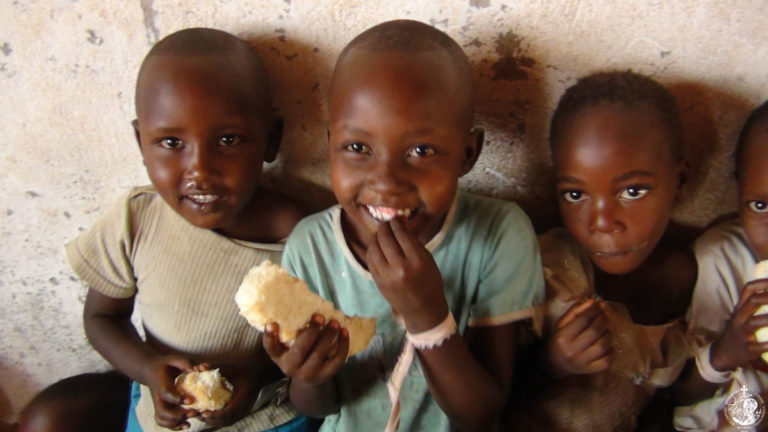
In Burundi, 40 kilometers northeast of Bujumbura, there is a vibrant Christian community of war refugees, rallied around the sacred church of Saint Alexius and the Twelve Apostles. These people, deprived of basic essentials, show an unparalleled will to survive. Last summer, we ordained as a priest the director of the school community; this way, we provided a solution to the problem of the priest there.
Another intractable for the time being problem pertains to education. As many as 700 children are literally crammed into the five classrooms of the primary school. There is an urgent need to add at least four classrooms, but the construction costs in both Burundi and Rwanda are extremely high due to the transportation costs from neighboring countries, as everything is imported. As for a secondary school, things are equally disappointing. The nearest middle school is 10 km away, distance which the few children that attend it have to cover on foot.
It is on foot as well that the sick have to go in order to reach the nearest “health station”, so to say. Also, the little students, before setting out for their school, have to walk 5 kilometers in order to fetch water for home – this is their own task – from the nearest borehole.
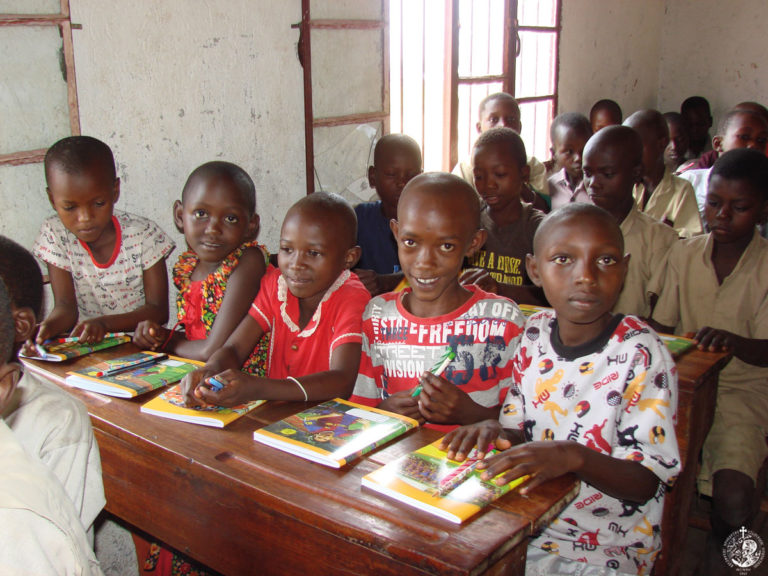
Both Burundi and Rwanda – even more in Rwanda – embraced Orthodoxy with great love. Seeking to explain the reason and without claiming infallibility, I concluded that this is due to the fact that our Mission is relatively new in the sense that it made its presence noticeable after the war, therefore, we are, in a way, incorruptible. Each of our pastoral journeys is for them an event of great importance, which is why they give us a warm and hearty welcome. Simple-hearted people, most of them without any special education -and this is only naturally expected, since the war was a catalyst for the evolution of life thereof. However, despite their simple-heartedness, their questions about the teachings of our Church, its Mysteries, its holy figures and religious traditions are anything but simplistic.
I would also like to refer to the role of the state as regards the operation of the Orthodox Church and not only. The Missions operate under the watchful eye of the state, which intervenes even in the selection of the building that houses us. According to the country’s Constitution, we are obliged to submit the beliefs of our Orthodox faith, the doctrinal truths of the Gospel as well as the charter of operation. If approved, we are granted a temporary permit for one year, extendable indefinitely. We expect to get ours in the August of the current year because we have work to present.
Specifically, we have founded eight parish communities in Rwanda, we have performed four priestly ordinations and we have sent six young Rwandans to the Makarios III Theological Seminary in Nairobi, Kenya, to be ordained after their graduation. After catechesis, we have baptized about six hundred Rwandans, while there are many more waiting to be baptized. Please note that all rites are performed outdoors, since we lack sacred churches. Also, the state gives special importance to social policy, which is why it works closely with us in the pursuit of social policy.
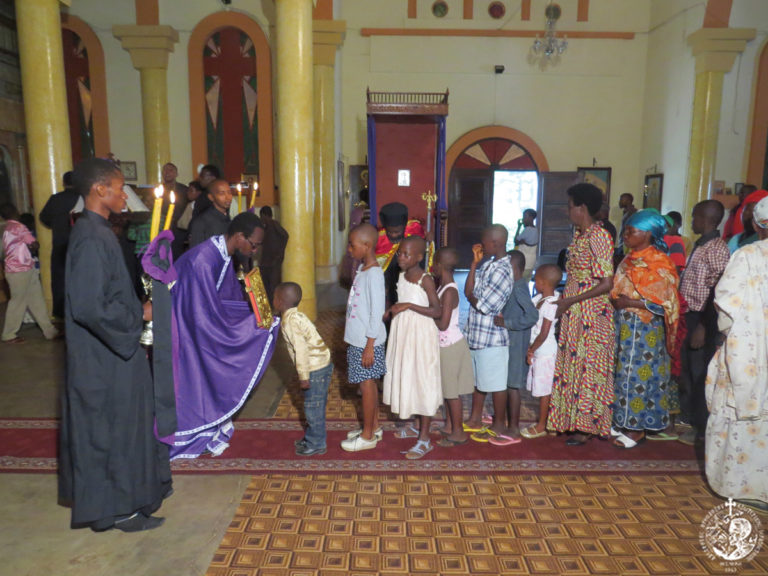
In general, the same applies to both countries with the following difference: In Burundi, the government gives us free land, provided we construct schools, churches and health stations. Indeed, we have already been granted two building plots, and we are trying to get the title deeds and find sponsors to promote the projects. Unlike Burundi, in Rwanda everything is sold at high prices.
In order not to inconvenience you any further, summing up, I will remind you that we have neither an episcopal residence, nor spaces for confession, catechesis and hosting friends-volunteers, who visit us from time to time. Some work is still in progress mainly due to shortage of money but also because of some legal obstacles, which we will hopefully overcome.
A particular problem is that of our moving around within the country as well as our transition from one country to another. Our car was damaged in a traffic accident. As a result, it is not uncommon for us to get stuck on the road and go on our pastoral visits by means of public transport, which is not at all frequent and makes us waste valuable time.
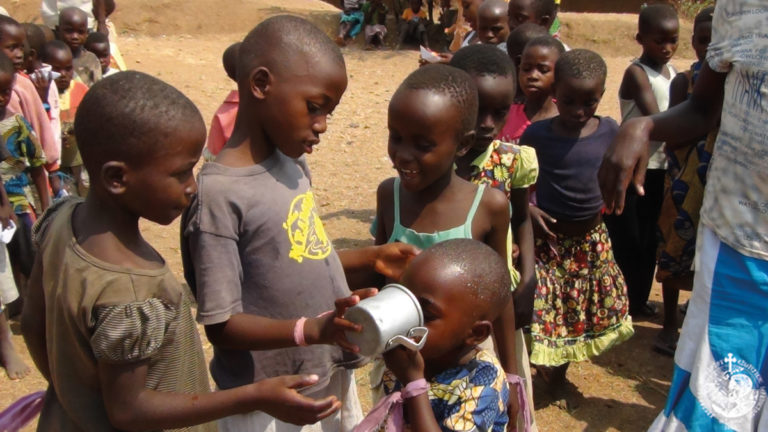
In closing, I would like once more to
appeal to your love and your charity feelings, which evidently
characterize you: Pray for us, become our companions, help us to teach
the creatures of God that we have been ministering to for two years to
recognize the miracles, that is, the essence of LIFE, to teach them that
LIFE is a gift of God to us and that the way they will live
their lives is their own gift to God. Let’s make, then, all of us, this
gift as wonderful as possible…
Click:
Orthodoxy in the Heart of Africa - in the Ends of the Earth!
Icons and the Black Church: The Time Has Come (& Orthodoxy in Uganda - Black Orthodoxy)
SONGS OF FREEDOM: The Rastafari Road to Orthodoxy
Orthodox Patriarchate of Alexandria and all Africa
We are Going to Live in Paradise: Orthodoxy in Congo
Swahili in St. Petersburg
Afrikaans cultural award for two Orthodox priests
Afrikaans Ortodoks
ORTHODOX MISSION IN TROPICAL AFRICA
An Orthodox parish in Turkana desert
The Orthodox Church in Haiti
Knowledge and Vision of God in Cappadocian Fathers
Travelers on the Way to the Light
Orthodoxy's Worship: The Sanctification of the Entire World
Theosis, St. Silouan and Elder Sophrony
LIVE, BEYOND THE LIMITS!
Man's Creative Power and the Knowledge of God
Deification - The Uncreated Light
Δεν υπάρχουν σχόλια:
Δημοσίευση σχολίου